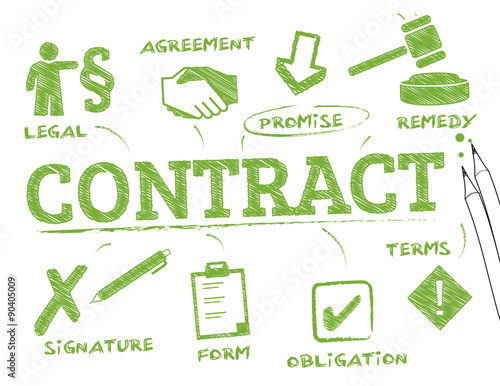Breach of contract: termination of contracts
Legal advice on termination of contracts: Coronavirus effects: force majeure clauses & frustration of contracts

Drafting, negotiating & explaining contracts
- terms and conditions of business
- intellectual property licensing agreements
- agency and distributorship agreements
- commercial property contracts
- agreements for the supply of goods and/or services
- contracts of employment
- shareholders’ agreements
- share sale & purchase agreements
- asset sale & purchase agreements
- assignments of intangible rights
- consultancy agreements
- commercial documents of all kinds that impose legal obligations on the parties.
Contract formation
A legally binding contract is created where:
- An offer has been accepted.
- The parties reach agreement on all the contractual terms which they regard, or the law requires, as essential.
- The parties intend to create legal relations.
- There is consideration.
The contract is created at the moment the parties reach agreement on all essential terms. It is clear that “unless all the material terms of a contract are agreed, there is no binding obligation” (Maugham LJ in Foley v Classique Coaches Ltd [1934] 2 KB 1).
In determining whether the parties have reached agreement on all essential terms, the governing criterion is whether an honest and reasonable businessman would have concluded from the parties’ communications and conduct that they had agreed all the terms they considered to be a precondition to creating legal relations.
Even if certain terms of economic or other significance to the parties have not been finalised, an objective appraisal of their words and conduct may lead to the conclusion that the parties did not intend agreement of such terms to be a precondition to a legally binding agreement.
In one of the leading cases on contract formation, RTS Flexible Systems Ltd v Molkerei Alois Müller GmbH & Company KG (UK Production) [2010] UKSC 14, the High Court, the Court of Appeal and the Supreme Court all reached different conclusions on whether a contract had been entered into, demonstrating that formation cases nearly always turn on questions of fact and as such are exceptionally dependent on the particular court.
Implied terms
A Court may imply a term into a specific contract to fill a gap, particularly a gap in the contract’s drafting. The rationale for implying a term in this way is to reflect the parties’ intentions when the contract was entered into. However, an implied term may be of little assistance if an agreement lacks certainty. Implied terms are often general in concept, and may not assist the court in determining key performance criteria if these have not been set out expressly in the agreement.
Start with the words used
The words in the document are the starting point, and very often the end point, for questions of interpretation.
“The primary source for understanding what the parties meant is their language interpreted in accordance with conventional usage.”
Intention assessed objectively
An objective test is used for ascertaining the intention of the parties to the contract. Their actual or subjective intentions are irrelevant. The standpoint of a reasonable businessperson is adopted. Where the contract is in writing, what the parties have written, rather than what they intended to write, constitutes the agreement.
It follows that the parties’ declarations of subjective intent are not relevant on a question of contract interpretation.
Reasonableness
When choosing between alternative interpretations, reasonableness alone may not indicate a correct interpretation.
The parties may have agreed something unreasonable, or even commercially foolish.
The courts will nevertheless be reluctant to accept an interpretation that leads to very unreasonable or absurd results or practical consequences.
The words on the page
Whatever the nature of your business and whatever the nature of the agreement which you intend to enter into, you should seek legal advice so that your agreement:
- is in writing, and therefore easy to prove if this becomes necessary;
- is in clear, unequivocal terms, so that instances of dispute can be avoided or more easily resolved;
- is enforceable – the terms of a a poorly-drafted contract may be unenforceable which, depending on the value of the contract, could potentially result in the significant losses to your business;
- provides for the unexpected – when the unexpected occurs, which it very often does, you need to be able to rely on the written terms for protection;
- has been properly negotiated and drafted in terms that meet you (rather than the other party’s) needs.
The whole contract approach
The document must be construed as a whole, in its context. All other terms must be considered. It is inappropriate to focus excessively on a particular word, phrase, sentence, or clause.
What makes a contract?
A contract is an agreement giving rise to obligations which are recognised or enforceable by law.
All kinds of commercial agreements may give rise to a contract: the agreement does not have to be in writing.
A contract is a legally enforceable agreement which gives rise to new rights and duties among those who agree to its terms. A contract is formed when the following key elements coincide (the key elements):
- Offer
- Acceptance
- Consideration
- Intention to create legal relations
- Certainty of terms.
Bringing the contract into existence
- The test of whether an offer has been accepted is objective: whether the words or conduct are such as to induce a reasonable person to believe that the other person intends to be bound.
- If there is a course of dealing between the parties, the person making the offer may be led to suppose that silence from the other party amounts to acceptance.
- Acceptance can be given by conduct. Where this amounts to a positive act it may well be clear that the offer has been accepted, although no words of acceptance have actually been spoken.
The commercial purpose
The court will consider the commercial purpose of the contract, or more narrowly the commercial purpose of a particular provision:
“In a commercial contract it is certainly right that the court should know the commercial purpose of the contract.”
The absence of a sensible commercial justification for a particular interpretation will weigh heavily against its adoption.






